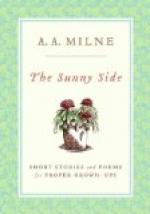“I don’t think I know it,” said Herbert. (He wouldn’t.)
“Oh, it’s quite easy. First you think of a proverb.”
“Like ‘A burnt camel spoils the moss,’” I explained.
“You mean ‘A burnt child dreads the fire,’” corrected Herbert.
Celia caught my eye and went on hurriedly, “Well, then somebody goes outside, and then he asks questions—”
“From outside?” asked Mrs. Herbert.
“From inside,” I assured her. “Generally from very near the fire, because he has got so cold waiting in the hall.”
“Oh, yes, I see.”
“And then he asks questions, and we each have to get one of the words of the proverb into our answer, without letting him know what the proverb is. It’s rather fun.”
Peter and his wife, who knew the game, agreed. Mrs. Herbert seemed resigned to the worst, but Herbert, though faint, was still pursuing.
“But doesn’t he guess what the proverb is?” he asked.
“Sometimes,” I admitted. “But sometimes, if we are very, very clever, he doesn’t. That, in fact, is the game.”
Our host got up and went to the door.
“I think I see,” he said; “and I want my pipe anyhow. So I’ll go out first.”
“Now then,” said Celia, when the door was safely closed, “what shall we have?”
Of course you know this game, and you know the difficulty of thinking of a proverb which has no moss or stable-doors or glasshouses in it; all of them words which it is impossible to include naturally in an answer to an ordinary question. The proverbs which Mrs. Herbert suggested were full of moss.
“What about ‘It’s never too late to mend?’” said Mrs. Peter. “The only difficult word is ‘mend.’”
“We mustn’t have less than seven words, one for each of us.”
“Can’t we get something from Solomon for a change?” said Peter. “’A roaring lion is a calamity to its father, but the cautious man cometh not again.’ That sort of thing.”
“We might try it,” said Celia doubtfully, not feeling quite sure if it were a real proverb; “but ‘cometh’ would be difficult.”
“I don’t see why,” said Herbert. “One could always work it in somehow.”
“Well, of course, if he asked you, ’By what train cometh thou up in the mornings?’ you could answer, ‘I cometh up by the ten-fifteen.’ Only you don’t get that sort of question as a rule.”
“Oh, I see,” said Herbert. “I didn’t quite understand.”
“After all, its really much more fun having camels and things,” said Celia. “‘It’s the last straw that breaks the camel’s back.’ Who’ll do ‘camels’? You’d better,” she added kindly to me.
Everybody but myself seemed to think that this was much more fun.
“I’ll do ‘straw,’” said Peter generously, whereupon Celia volunteered for “breaks.” There were seven of us for nine words. We gave Mrs. Herbert the second “the,” fearing to trust her with anything more alarming and in order to keep it in the family we gave the other “the” to Herbert, who was also responsible for “back.” Our hostess had “last” and Mrs. Peter had “that.”




